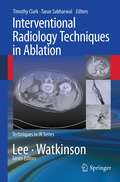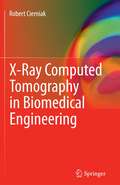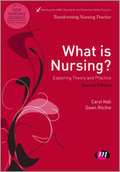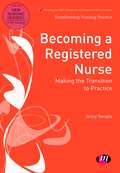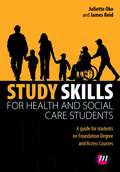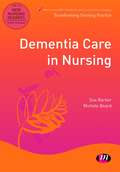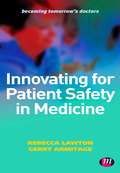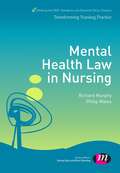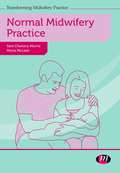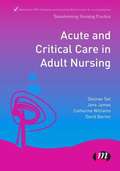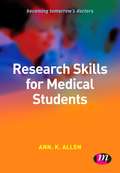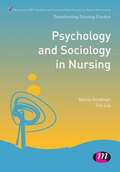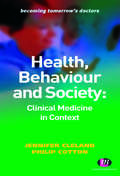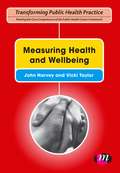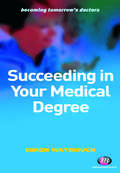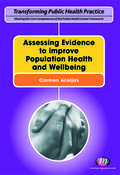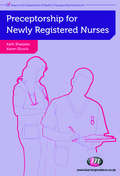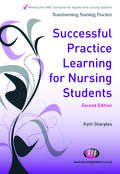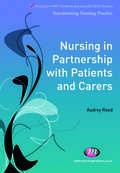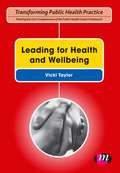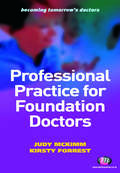- Table View
- List View
Interventional Radiology Techniques in Ablation
by Timothy Clark Tarun SabharwalThe Techniques in Interventional Radiology series of handbooks describes in detail the various interventional radiology procedures and therapies that are in current practice. The series comprises a number of titles, which cover procedures in angioplasty and stenting, transcatheter embolization and therapy, biopsy and drainage, ablation, pediatric interventional radiology and neurointerventional radiology. Each book is laid out in bullet point format, so that the desired information can be located quickly and easily. Interventional radiologists at all stages, from trainees through to specialists, will find this book a valuable asset for their practice. Interventional Radiology Techniques in Ablation is a practical and concise guide to contemporary techniques in image-guided tumor ablation. This handbook is intended to serve as a quick reference for physicians in interventional radiology training as well as a resource for IR technologists, nurses, nurse practitioners and physician assistants.
X-Ray Computed Tomography in Biomedical Engineering
by Robert CierniakComputed Tomography gives a detailed overview of various aspects of computed tomography. It discusses X-ray CT tomography from a historical point of view, the design and physical operating principles of computed tomography apparatus, the algorithms of image reconstruction and the quality assessment criteria of tomography scanners. Algorithms of image reconstruction from projections, a crucial problem in medical imaging, are considered in depth. The author gives descriptions of the reconstruction methods related to tomography scanners with a parallel X-ray beam, trough solutions with fan-shaped beam and successive modifications of spiral scanners. Computed Tomography contains a dedicated chapter for those readers who are interested in computer simulations based on studies of reconstruction algorithms. The information included in this chapter will enable readers to create a simulation environment in which virtual tomography projections can be obtained in all basic projection systems. This monograph is a valuable study on computed tomography that will be of interest to advanced students and researchers in the fields of biomedical engineering, medical electronics, computer science and medicine.
What is Nursing?: Exploring Theory and Practice (Transforming Nursing Practice)
by Carol Hall Dawn RitchieThis book helps new nursing students, and those thinking of entering the profession, understand what it is to be a nurse in today's rapidly changing healthcare environments. The new edition includes a new first chapter on becoming a nursing student, with insights from students themselves. The book also explains the process of nursing and systems of care delivery which underpin actual practice. A chapter on international working is included for those working or studying abroad. Finally, it explores what nursing is really like when you qualify through interviews with registered nurses in each of the main nursing fields of practice.
Becoming a Registered Nurse: Making the transition to practice (Transforming Nursing Practice)
by Mrs Jenny TempleFinal-year nursing students are often nervous about making the transition to being a registered nurse. This book helps students prepare for their first nursing role and uses 'real life' scenarios to consolidate their skills. It guides students through the final year with its increased demands, and assists them in meeting the NMC requirements for registration. It covers content commonly found on final year transition to practice modules including coping with stress; applying for jobs; what to expect from your first role; dealing with change; delegating and managing junior staff; handling risky situations; managing priorities and developing your career.
Study Skills for Health and Social Care Students (Achieving a Health and Social Care Foundation Degree Series)
by Ms Juliette Oko James ReidMany students on Health and Social Care Foundation Degree and Access courses struggle with the academic expectations required of them at this level. This book is written to support such students in adapting to self-directed study, understand the assessment process and how they can make the most of their learning opportunities. The authors also cover practicalities such as avoiding plagiarism, using their studies to become a reflective practitioner, and understanding the benefit of research and critical thinking. More than a generic study guide, this book is practice-based and will be of great benefit to health and social care students. SAGE Study Skills are essential study guides for students of all levels. From how to write great essays and succeeding at university, to writing your undergraduate dissertation and doing postgraduate research, SAGE Study Skills help you get the best from your time at university.
Dementia Care in Nursing (Transforming Nursing Practice)
by Sue Barker Mrs Michele BoardDementia care presents a huge challenge to health and social care both now and in the future. The number of those in the UK with dementia is expected to increase to 1.4 million in the next 30 years. Regardless of the field of nursing, all nurses need to understand the experiences of a person with dementia and the issues related to their care. This book provides an introduction to dementia care for nursing students with an emphasis on humanizing care. Real life case studies show the person behind the patient and explore the ethical dilemmas that a nurse may face.
Innovating for Patient Safety in Medicine: 9780857257659 (Becoming Tomorrow′s Doctors Series)
by Rebecca Lawton Gerry ArmitageThis book helps the next generation of doctors understand how to contribute to making healthcare safer. Patient safety is increasingly important in medical practice today and is becoming a core part of training for medical students and foundation doctors. This book will enable the student or junior doctor to challenge and innovate in practice to improve patient safety and care. It takes a practical approach and explores what patient safety is, why it is important, how to involve patients, the role of education, technology and resources, how to be an innovative practitioner and measuring the impact of patient safety initiatives.
Mental Health Law in Nursing (Transforming Nursing Practice)
by Richard Murphy Philip WalesMental health nursing students need to understand their legal duties towards all clients, including specific laws for care of detained patients. Yet these laws can be comples, confusing, and difficult to relate to the reality of nursing care. This book is a clear guide to the Mental Health Act and Code of Practice which explains the specific duties, responsibilities and powers of mental health nurses and the care of detained patients in particular. It explains the most frequently encountered parts of the Act and Code and clarifies common misunderstandings. It outlines dilemmas faced by nurses which may arise from possible conflicting responsibilities. It also gives an introduction to other major legal considerations that mental health nursing students need. Key features: Specific guide to the law for mental health nursing students, written by experienced practitioners involved in MHA regulation in England Case studies and examples help the reader relate the law to their clinical practice Multiple choice questions and acticvities help students to develop confidence and become critical and independent learners Linked to relevant NMC Standards and ESCs for degree-level education.
Normal Midwifery Practice (Transforming Midwifery Practice Series)
by Sam Chenery-Morris Moira McLeanFor new students the language and concepts of midwifery care can at first be daunting. This book helps students to understand the expectations of midwifery training in relation to normal midwifery practice. It covers the basics of midwifery care including professional practice, frameworks informing midwifery care, key concepts and philosophies of care, communication and care skills, antenatal care, normal labour and birth, postnatal care, neonatal care and breastfeeding, as well as a brief introduction to medicines management in normal midwifery care. The book is designed to work alongside first taught modules in midwifery, and underpin training in subsequent years.
Acute and Critical Care in Adult Nursing
by Catherine Williams Desiree Tait Dr Dave Barton Jane JamesThe assessment and management of patients who are critically or acutely ill, or showing signs of clinical deterioration, is a crucial nursing skill. This book will help adult nursing students to competently manage care of critically and acutely ill patients, and to recognise and deal with the early signs of deterioration. The book takes a practical real-life approach to care, with each chapter focussing on patients with specific problems, then interweaving the knowledge and skills needed to care for that patient, including the nurse's role and responsibilities, assessment, diagnosis, planning, management, related pathophysiology and collaborative team working.
Research Skills for Medical Students (Becoming Tomorrow′s Doctors Series)
by Ann AllenThe revised Tomorrow′s Doctors makes it clear that doctors need to be aware of their responsibilities as scholars and scientists and it is therefore vital that students develop excellent research skills. Whilst there are many ′research skills′ books, medical students frequently struggle with understanding the difference between the practices of research, audit, service evaluation, systematic and narrative reviews and when and how to apply them. This book addresses the kinds of questions novice investigators always ask and helps students utilise study designs, data collection tools and analysis effectively.
Psychology and Sociology in Nursing
by Tim Ley Mr Benny GoodmanThis book explores the sociology and psychology relevant to nursing and explains why it is so important to understand these subjects in order to be a good nurse. It has been written specifically for nursing students, and explains clearly the key concepts in both disciplines that they need to grasp. Chapters move from the individual to wider societal issues and look at the psychological and sociological basis of professional values, interpersonal relationships, nursing practice, decision making, leadership and management and teamworking. Each of the fields of nursing are explored to show the specific application of these disciplines to each.
Passing the UKCAT and BMAT
by Felicity Taylor Rosalie Hutton Glenn HuttonThis revised and updated 2012 edition is the most comprehensive guide available to the UKCAT and BMAT. You will find all you need to face the tests with confidence, fulfill your potential and succeed in your application - whichever universities you are applying to. New questions have been added to the extensive practice sections for both the UKCAT and BMAT. In addition this essential text takes you through everything you need to know from writing your personal statement and preparing for interviews to time management and test-taking strategies. The 2012 edition includes: -new questions in both the UKCAT and BMAT sections - comprehensive guidance on applying to study medicine -up-to-date fees and dates for the 2012 tests A companion volume, Practice Tests, Questions and Answers for the UKCAT, is also available for purchase from Learning Matters
Health, Behaviour and Society: Clinical Medicine In Context (Becoming Tomorrow′s Doctors Series)
by Jennifer Cleland Philip Cotton Jennifer Cleland, Philip CottonThere is more to a person than a particular symptom or disease: patients are individuals but they are not isolated, they are part of a family, a community, an environment, and all these factors can affect in many different ways how they manage health and illness. This book provides an introduction to population, sociological and psychological influences on health and delivery of healthcare in the UK and will equip today’s medical students with the knowledge required to be properly prepared for clinical practice in accordance with the outcomes of Tomorrow’s Doctors.
Leadership, Management and Team Working in Nursing
by Shirley Bach Peter EllisLeadership, management and team working have become central to the role of the nurse, as recognised in the latest NMC standards for education. This book assists students in meeting the NMC requirements, and helps them apply recent leadership and management theory to the nurse's role. It explores students' current perceptions and concerns, giving practical guidance for immediate challenges the new nurse will face: team working, delegation, conflict management and negotiation. It then considers staff development and motivation, mentoring, supervising and creating a learning environment. Later chapters explore more complex aspects such as management theory, recruitment, risk management and managing change.
What is Nursing? Exploring Theory and Practice
by Carol Hall Dawn RitchieThis book helps new nursing students, and those thinking of entering the profession, understand what it is to be a nurse in today's rapidly changing healthcare environments. The new edition includes a new first chapter on becoming a nursing student, with insights from students themselves. The book also explains the process of nursing and systems of care delivery which underpin actual practice. A chapter on international working is included for those working or studying abroad. Finally, it explores what nursing is really like when you qualify through interviews with registered nurses in each of the main nursing fields of practice.
Measuring Health and Wellbeing (Transforming Public Health Practice Series)
by John Harvey Vicki TaylorBuilding on the core competences for public health, this book focuses on key areas of surveillance and assessment of the population′s health and wellbeing. It is concerned with assessing and describing the needs, health and wellbeing of specific populations, communities and groups. The authors also look at how to monitor these aspects of public health and explore qualitative and quantitative methods for measuring, analysing and interpreting health and wellbeing, needs and outcomes. Case studies, activities and research summaries are used throughout the book to help the reader understand how to apply theory to practice.
Succeeding in Your Medical Degree (Becoming Tomorrow's Doctors Series)
by Simon WatmoughStudents may not be aware of it but Tomorrow’s Doctors (2009) will have a significant impact on their undergraduate medical education. Aimed at new medical students, this book highlights the key themes in UK medical education and how the recommendations in Tomorrow’s Doctors will affect their education and subsequent career. Covering topics such as professionalism, leadership, medical informatics and peer tutoring in addition to more familiar areas such as assessment, student-selected components, simulation and clinical attachments, this book will help medical students to understand the course they are embarking on and, ultimately, to succeed at becoming doctors.
Assessing Evidence to Improve Population Health and Wellbeing (Transforming Public Health Practice Series)
by Carmen AceijasWritten to support practitioners undertaking a Masters in public health, this book considers the main concepts, issues and methodologies of the second core competence of the Public Health Skills and Career Framework: 'Assessment of evidence of the effectiveness of interventions, programmes and services to improve population health and wellbeing'. Coverage includes the theoretical definition of evidence and its use in public health, the role of critical appraisal methods and tools in evidence assessment and how Effectiveness, Efficiency and Quality inform evidence. The book is packed with case studies and activities to help link theory and practice and prompt personal reflection.
Preceptorship for Newly Registered Nurses (Post-Registration Nursing Education and Practice LM Series)
by Kath Sharples Karen ElcockNewly qualified nurses can find their first year of practice a daunting experience. This book is specifically written to support new nurses through the demands of their preceptorship year. Each chapter provides friendly and practical support on the main areas of development needed for new nurses to become confident practitioners. The book is also designed for use on formal preceptorship programmes and covers each of the areas for professional development outlined in the Department of Health's new Preceptorship Framework (2010). Packed with activities, case studies and down to earth advice, this book provides essential support for the newly registered nurse.
Successful Practice Learning for Nursing Students (Transforming Nursing Practice)
by Kath SharplesPre-registration student nurses spend 50% of their training in practice which provides a wealth of opportunities to develop their knowledge and skills. However, many new students find themselves in a clinical environment which is foreign and confusing. The new edition of this popular book (formerly Learning to Learn in Nursing Practice) helps nursing students prepare for their practice learning experiences, and get the most out of them in order to achieve the required standards. This book is, first and foremost, a practical guide for students on developing learning skills during their practice experiences.
Nursing in Partnership with Patients and Carers (Transforming Nursing Practice)
by Audrey ReedFuture healthcare services are changing to give patients more rights over their own healthcare. The NMC requires that nurses work in partnership with those in their care. This book provides a timely guide to enabling patient and carer participation in nursing care. It challenges the reader to see the person in the patient and explores the nature of the nurse-patient relationship. It gives practical advice on how students can promote participation on placements and in practice. The book also offers an insight into the realities of being a carer, and discusses how quality of patient experiences can be assessed.
Leading for Health and Wellbeing (Transforming Public Health Practice Series)
by Vicki Taylor′Building on the core competences for public health, this book focuses on the key areas of leadership and collaborative working to improve health and wellbeing. Aimed at those undertaking Masters courses in public health and health promotion, (as well as those seeking to gain public health registration through the compilation and submission of a portfolio) this book focuses on leadership and collaborative working to improve health and wellbeing. Leadership, building alliances, developing capacity and capability, working in partnership with other practitioners, agencies and communities, understanding different organisational stuctures and cultures and working effectively across organisational boundaries are central themes throughout this book. Leadership skills such as negotiation, persuasion and influencing and the nature of power and the importance of understanding one′s self and the communication process and project management skills and leading and managing change to improve health and wellbeing are considered. Case studies, activities and research summaries are used throughout the book to help the reader to understand how to apply the theory to practice.
Professional Practice for Foundation Doctors (Becoming Tomorrow′s Doctors Series)
by Kirsty Forrest Judy McKimmThis book is designed to support trainee doctors during the Foundation Stage of postgraduate training, including preparation and application for Specialty Training posts, and covers the generic (non-clinical) aspects of postgraduate education, training and professional development. It shows trainees how the ′generic skills′ fit into professional practice and development and how the knowledge base provided by the book underpins professional practice. The book will assist the development of the knowledge, skills and competences required for good medical practice and uses case studies, activities and policy examples to illustrate key learning points.
Successful Mentoring in Nursing
by Liz Aston Paula HallamSupporting students poses a significant challenge for nurse mentors and other healthcare professionals in today’s world of practice. Recent concerns over the fitness to practise of student nurses at the point of registration, and the move to graduate pre-registration programmes from 2011, require new approaches to placement learning and mentoring the nurse of the future. This book offers clear practical advice on how to acquire and develop mentorship skills to support degree-level nursing students. It encourages the mentor’s continued development during and after their mentor training, and covers the skills required from novice mentorship through to sign-off mentorship.
